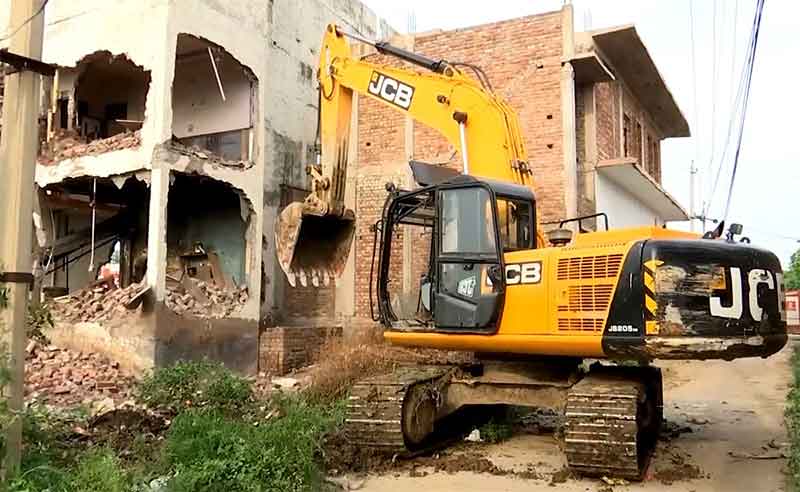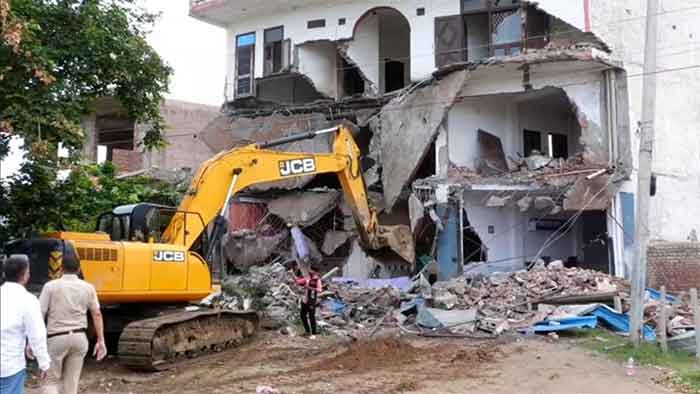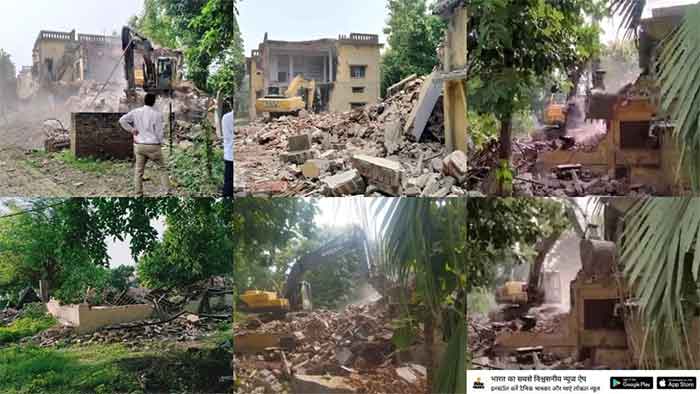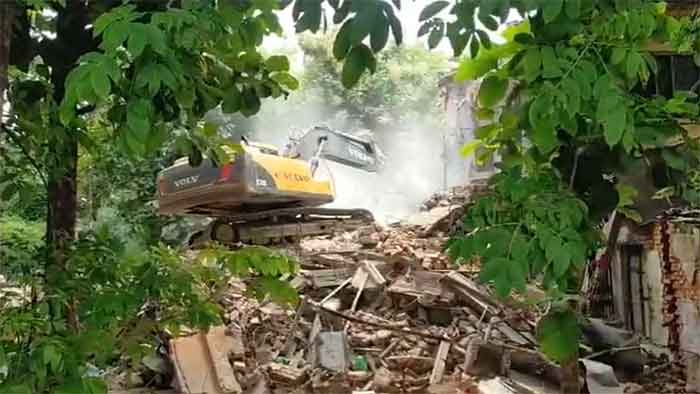Can the Guwahati High Court’s Judgement on ‘Illegal Demolitions’ act as a break to the growing normalisation of ‘Bulldozer Justice’ ?
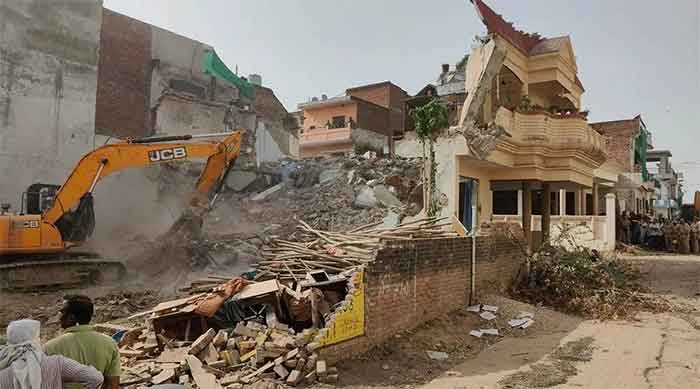
There are interventions of courts which occasionally reverberate across the country.
The recent judgement of the Guwahati High Court which had suo moto taken up a petition regarding ‘illegal demolitions’ of houses in Village Salonabari, Nagaon district in Assam ( May 2022) could be categorised as one such intervention.
The two judge bench of the high court led by Chief Justice RM Chhaya and Justice Soumitra Saikia came down heavily on demolitions executed without following any procedure and declared such actions ‘illegal’ and also directed the BJP-run Assam government to take “appropriate decision” for compensating those affected by the demolition and also action against the responsible officials. As per reports the Assam government has promised that it will do the needful within a fortnight. (https://www.telegraphindia.com/north-east/setback-to-assam-bulldozer-raj-trial-run/cid/1907869)
No doubt in an ambience where there was growing fascination for using bulldozers – mainly among BJP ruled states and its supporters – to render ‘instant justice’ this intervention does raise hope.
It is a different matter that a day after this judgement was delivered Yogi Adityanath, Chief Minister of Uttar Pradesh, while talking to investors in Mumbai was singing paens to the use of Bulldozers and was even seen glorifying it as a ‘..sign of peace and growth’ (https://thewire.in/politics/bulldozers-can-be-a-sign-of-peace-and-growth-says-yogi-adityanath) either oblivious of Guwahati high court’s strong remarks against demolitions or despite them perhaps displaying his regime’s supposedly ‘no nonsense attitude’ towards miscreants.
A recap of the developments in Salonabari tell us that it has been around eight months that Nagaon police had descended on this village, comprising of around 3,000 residents – mainly Bengali Muslims – with bulldozers and started demolishing houses of Safiqul Islam – who had died allegedly in police custody a day before – and his close relatives who were still in the mourning, without any prior notice or information.
Death of Safiqul Islam is still shrouded in mystery.
It was May 20 th 2022 when the 39 year old Safiqul – who sold fish to make a living – was on his way to Sivsagar District for his business, when he was detained by the police for ‘drunken behaviour’.
By next morning he was dead.
In the meanwhile – as per his relatives the police had demanded some bribe for his release, which the family was not in a position to pay. (https://www.thehindu.com/news/national/other-states/mob-torches-assam-police-station-after-man-dies-in-custody/article65442799.ece) Agitated over his death on May 21 an angry crowd – which included his relatives – marched to the Batadrava Police Station and held demonstrations and as per police reports set fire to it, where Safiqul had spent the previous night. (https://scroll.in/article/1024841/death-demolitions-terror-charges-in-ravaged-assam-village-residents-contradict-police-claims)
Just after his funeral on May 22, his wife and his eldest daughter, a student of Class 8, were picked up by the police for arson and two of his brothers were also arrested under draconian laws like UAPA and houses of Safiqul Islam and his brothers were demolished by bulldozers.
What is perhaps emphasising that not only the residents of the village denied the charges by the police that they were involved in arson at the police station but there was confusion about the whole operation among police officials as well. These demolitions were initially called an ‘anti-encroachment drive’ but later described as ‘search operations’.(https://scroll.in/article/1024841/death-demolitions-terror-charges-in-ravaged-assam-village-residents-contradict-police-claims)
Coming to rest of India, demolition of houses in Salonabari, Nagaon was no exception.
It was the same period when the Bulldozer mania was slowly catching on.
Starting from Uttar Pradesh followed by M.P, Gujarat and later Assam and Karnataka, – all of them BJP ruled states – police was found to be increasingly resorting to similar vigilante justice.
No questions asked, no wait for court cases to finish, no need to engage in legal formalities
May it be case of running away of adult couples or somebody being in conflict with law or even in cases of communal violence, police in such states was found to be increasingly resorting to similar actions.(https://www.newsclick.in/india-must-stop-glorifying-collective-punishment)
What was rather disturbing that despite facts coming to the fore that such arbitrary state action was violating the settled principles of natural justice such as the right to be heard and the right to prior notice, judiciary had preferred to maintain an ambivalent stand on such illegal demolitions. (https://scroll.in/article/1026248/why-is-indias-judiciary-not-acting-to-stop-the-spate-of-illegal-demolitions-across-the-country)
Forget lower courts or highcourts, even the highest courts of the country, had also not covered itself with glory in a similar case which had come up before it earlier. It was only last year that Jamiat Ulama i Hind – an organisation of Islamic Scholars affiliated to the Deobandi School and which had its genesis in the anti-colonial struggle -had moved a petition against the ongoing demolitions in UP. One can recall that although it was clear that that the executive was found to be doing excesses the highest court did not even grant interim stay which resulted in continued demolition mainly in Muslim majority areas ( Frontline – September 9,2022 ; Disturbing Signals, Page 18)
If one looks at this background, the importance of the judgement by the Guwahati high court can easily be understood.
Anyone who has followed demolition of houses in Salonabari would know how the High Court in one of its first hearing itself lambasted the police and the administration for its arbitrary action. It clearly emphasised that police cannot, “under the guise of investigation”, bulldoze anyone’s house without permission, and if such practices continue then “nobody is safe in this country” (https://indianexpress.com/article/north-east-india/assam/gauhati-high-court-raps-nagaon-police-bulldozing-arson-accuseds-house-8277658/) It also added : “Show me from any criminal jurisprudence that for investigating the crime, the police, without any order, can uproot a person, apply a bulldozer. As per the report… police needed an excavator to dig the house. For that, he requires permission.”
The courts had no qualms in comparing the arbitrary action by the executive with what happens in films and adding with bit sarcassm “Maybe in films one can see such atrocities but never to be allowed in a civilised society,” (https://english.mathrubhumi.com/columns/law-and-life/bulldozer-police-victims-to-be-compensated-rules-guwahati-high-court-1.8210942)
Can it be said that Guwahati High Court’s emphasis on rule of law and maintaining Consitutional Principles in the Salonabari, Nagaon District case perhaps inspired judiciary elsewhere to leave its ambivalence and take a clear stand on demolitions ? (https://www.barandbench.com/news/litigation/courts-v-bulldozers-five-recent-instances-of-judicial-intervention-in-demolition-drive-cases)
Of course, there is no proof to look into the matter but one should not forget that merely few days after the first hearing on the demolition of houses in Salonabari by the Guwahati High Court, the Patna high court condemned the use of bulldozers by Bihar Police for demolishing the house of a woman without following the due process of law (https://www.indialegallive.com/constitutional-law-news/courts-news/patna-high-court-bihar-police-illegal-demolition/)
When the petitioner alleged that the illegal demolition was carried out at the behest of some land mafia, the Single-Judge Bench of Justice Sandeep Kumar said, “Is the bulldozer being run here too?” It then asked the Police, “Whom do you represent, the state or some private person? You are creating a scene by demolishing anyone’s house with a bulldozer.”
It is rather difficult to gauge from afar what has been the reaction of the residents of Village Salonabari, Nagaon district in Assam – whosoever remains there – to the court’s decision.
Whether they know that the high court has ruled in their favour and has directed the government to take action against guilty officials and also provide compensation.
As one thinks about it one has before one’s mind’s eye faces of four and half year old Tultul Begum and her ten year old elder brother Adil Islam, whose father Rofikul Islam, brother of Safikul Islam is also in jail, over the alleged arson at the police station. (https://scroll.in/article/1024841/death-demolitions-terror-charges-in-ravaged-assam-village-residents-contradict-police-claims)
Of course, they are not the only children whose entire life lied shattered last year when police swooped down on their village with bulldozers.
Perhaps it would be difficult for them to comprehend what is an adequate compensation and what action would be taken against those police officials.
For them the most important would be return of their father to their dilipadated home again and also all their close relatives and they start to live a normal life again.
Subhash Gatade is a left activist associated with New Socialist Initiative

